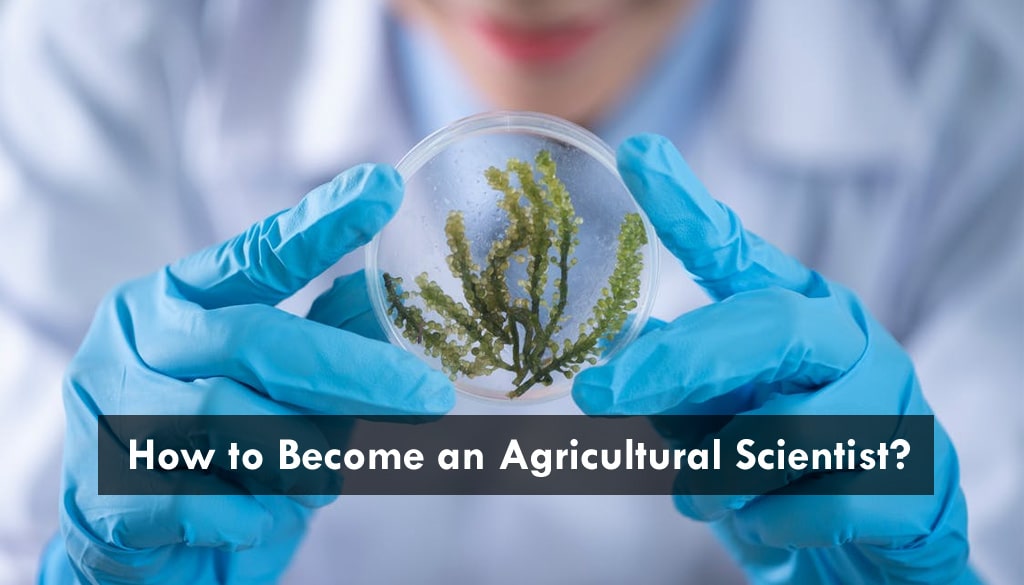
How to Become an Agricultural Scientist?
Agricultural Scientist is the one who is a specialist in analyzing farming methods and food production methods to enhance safety and crop yield. Through research, an agricultural scientist works on new and innovative ways to increase the quality of food grown and supplied. In complete coordination with the scientific community and policy-makers, an agricultural scientist reaches to the solution.
Agriculture is a vast developing economical industry and is a good option to choose a career as an agricultural scientist. Agriculture is very important in the growth of the rural economy as 60% of the Indian population is devoted to the primary sector and contributes to 18% of India’s GDP. As an agro scientist, you will be carrying out various researches dealing with crops, animals and plants and deriving out solutions for healthy and safe delivery of foods, raw materials as well as welfare for the rural and farmworkers. It’s a good option as day by day, the demand for healthy food is increasing.
Roles of an Agricultural Scientist:
- Developing effective scientific strategies for cheap and easy farming techniques and animal husbandry, and educating the farmers.
- Developing crops for higher yield, pest and harsh environment resistant and for safe consumption.
- Strategies for smart farming using technology, organic farming and preservation techniques.
- Assessing agricultural activities and production and design strategies, suggestions to improve the growth in terms of productivity and economy and enhancing international trade.
- Partnerships with other agro scientists and institutions and implement various safe understands for food production and service industries.
- Analyze the issues, demands of farmers and public, things lacking behind and strategize methods to tackle such problems.
Also Read:- Scope of Biotechnology: Understanding Various Specializations & Career Opportunities
How can you become an Agricultural Scientist?
To become an agricultural scientist, an aspirant must have scored at least 50% and 40% for SC/ST in Physics, Chemistry and Biology in Class XII. Also, when it comes to engineering like agricultural engineering, an aspirant should have studied Maths in Class XII.
You can do B.Sc / B.Tech with at least 60% in agriculture, agricultural biotechnology or microbiology, agriculture-related fields like plant genetics, plant breeding, sericulture, forestry, agriculture engineering and related fields, biotechnology, dairy or food technology, soil science, crop management, agricultural economics etc.
After this, M.Sc/M.Tech is necessary in any of the agricultural specialized courses with at least 65%. And then finally, you need to have a Ph.D. and in fact, a post-doctoral degree from a reputed institution can also become necessary.
To get established as a scientist in India’s reputed agricultural institutes and R&D sectors like ICAR after PhD, you can give Agricultural Research Services (ARS) NET exam where you have to qualify preliminary, mains and interview.
Remember for any scientist, patience, hard work, determination, experience and exposure to the field and technology are really required so with this, I hope this article has guided you to some extent in shaping your career path, short-term and long-term goals.
Wish you very good luck to all the readers.
To excel as an agricultural scientist, you need to have a good hold of the following abilities:-
- Must have good communication skills both oral and written along with team management skills.
- Must possess good observatory, analytical and supervisory skills and think of unique and creative strategies for development which enhances a country’s economy.
- Able to derive practical, logical and eco and public friendly solutions to tackle agro related problems.
- Updated knowledge of existing and new technology and have the ability to handle them and apply them in their field.
- Must have good knowledge and should be friendly with all laboratory techniques related to the field.
- Requires a high degree of patience, interest, hard work and some basic business knowledge.
Written By:- Anoushka Roy, B.Tech Biotechnology student (IIIrd Sem) at MRIIRS



